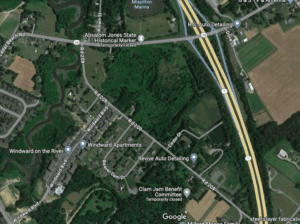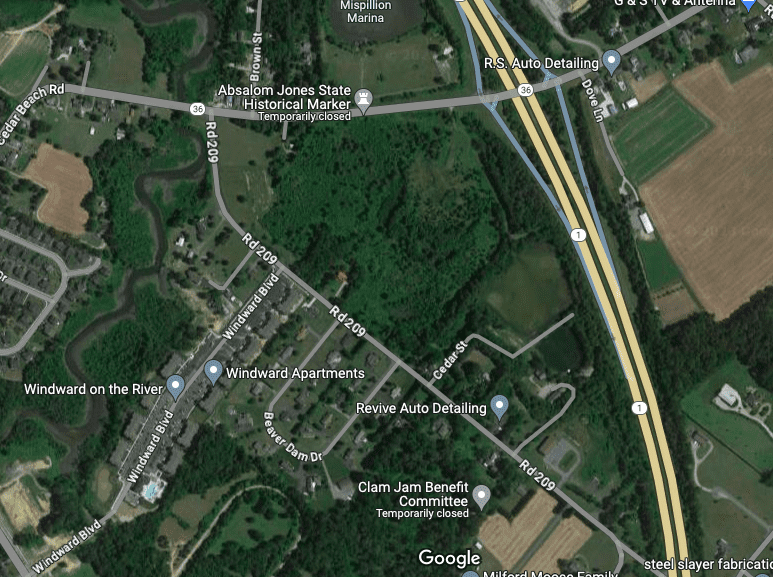

The City of Milford agreed to cover the Knight’s Crossing share of a sewer pump station for this area in order to reimburse Winward on the River for the costs they incurred to build the station. Costs will be recovered once Knight’s Crossing begins construction. (Photo courtesy of Google Maps)
At a recent meeting, Milford City Council agreed to take on costs originally to be paid by the Knight’s Crossing development for a regional sanitary sewer pumping station that had already been constructed with funds from Winward on the River. Initially, the city required Knight’s Crossing to enter into a private, cost-sharing agreement with Winward on the River to facilitate the recovery of pro-rate costs expended by the latter development. According to Rob Pierce, City Planner, the Knight Crossing development progressed much slower than the Winward on the River project and the cost-sharing agreement was never executed.
“Staff is recommending City Council consider providing the Knight Crossing cost share to the Windward developer and recouping those costs from the Knight Crossing development at a later date through the payment of an Aid-in-Construction fee. This is similar what we’ve done historically in the past,” Pierce said. “We’ve done this for the Bayhealth pump station, for which we carried some of the debt of the pump station for properties that were not able to participate at the time, but it made sense for the city and the region, in general, to design the system to accommodate that land. We’ve also done this many years ago for the Shawnee Acres pump station back when we first expanded to the southeast area in the early 2000s.”
Pierce continued that in order to accomplish the change, amendments were necessary to both the Winward on the River agreement as well as the agreement with Knight Crossing. Councilman Dan Marabello confirmed that the city would be advancing over $460,000 to Winward on the River to cover the costs that should be paid by the Knight’s Crossing developer.
“We’re contributing to the regional sewer pump station that was constructed by a single developer that would serve an area and that money would be recouped by whoever ties in for those additional 182 equivalent dwelling units,” Pierce said.
Councilman Marabello questioned if Winward was putting up the money for the pump station and Pierce explained that the pump station was already built with the costs already incurred. Councilman Marabello asked if the funds would be recovered when the Knight’s Crossing development moved forward.
“Correct. We would get that back through at construction charges, which will be charged at the time of building permit issuance, or any future development that would tie into that,” Pierce said. “We have a provision in the development agreement that that fee would increase by the same rate that the impact fees increase annually on July 1, which is currently at around 4%.”
When asked when the Knight’s Crossing project would commence, Pierce stated that he was not sure, but that they already had approval for Phases 1 and 2A.
“We were awaiting the signing of the cost share agreement between the two parties to approve phase 2B, but like I said, there hasn’t been as quick a movement on the Knight’s Crossing as opposed to the Winward,” Pierce said. “So, I can’t speak particularly on the timing of the Knight Crossing project, but it looks to me like they are trying to move forward to get their plans approved and recorded and kind of move on with the area, but we also know that Winward put out the money to build a regional station.”
As for the four percent increase per year, Councilman Marabello asked Councilman Jason James, whose background is in finance, if he felt four percent was reasonable.
“I wish we had more time to discuss this before now, because now we are going to get into some minutia when we talk about how we’re going to get paid, what is the four percent, is it annual or is it four percent at the time of the project,” Councilman James said.”
Pierce stated that the AIC would increase at the same rate as impact fees on July 1st and that is currently set by council at four percent. It is similar to what was done for Bayhealth and for the Hall farm four or five years ago.
Councilman Marabello asked if the impact fees could go up higher than four percent and Pierce stated that it would be based on the amount that was in the agreement, regardless of the increase in impact fees. City Manager Mark Whitfield explained that if Knight’s Crossing did not occur for 10 years, hypothetically, the cost they would pay the city for the pump station would grow from $468,000 to around $600,000. Councilman Marabello compared the funding to a bridge loan for the next builder. Councilman James agreed that this was important as it was for development, but wanted to know how this would impact sewer reserve fees which totaled $3.1 million currently.
“It’s a good point. The sewer impact fees are invested with some of the other reserves, and they’re earning somewhere between four and five percent. Now a little bit closer to four. There were years where they are at five basis points,” Lou Vitola, Finance Director, said. “And we were still, the impact fee, escalation schedule is a little over four percent. And the amount of the fee is tied to the underlying construction and asset, but that four percent escalator while it’s constant, now across all impact fees, and I believe all AIC schedules that can diverge if counsel would see fit, much like you can do a cost of service rate study, we can have our impact fees looked at too. Mark and I are exploring that now. And we have some alternatives in place if we want to take a deeper dive into all the different types of water, sewer, impact fees, electric connection fees, and the AICs and at what rate now and in today’s current environment should they escalate.”
Councilman James asked how much of sewer impact fees were invested to which Vitola stated that most of them are invested, but that it would not be a hardship to cover the cost of the pump station temporarily. Councilman Marabello questioned what exposure the city had should the Knight’s Crossing development not get off the ground for a long time.
“The exposure is limited to the actual contribution amount. And I don’t even think that is the level of the exposure because we have certainty with respect to this regional sewer facility. It’s not like we are consuming this money to invest in new sewer facilities that we’re going to have to wait for the first drop of sewer to land,” Vitola said. “This is something that was already constructed several years ago with pricing by the two developers in the area for 100 percent of the shared capacity. And this is just a slice of the of the capacity that we’re buying into at yesterday’s rates. And the opportunity cost of it should be offset, if not in two, three, five years, then almost certainly 15 years, 20 years.”
Councilwoman Katrina Wilson confirmed with Pierce that the city had done this several times in the past, with Bayhealth and the Hall property.
“Bayhealth was the large player with that pump station, and so it was Wickersham, and also Wilson Contracting, but there was 50 EDUs that were carried by the city for the Bayhealth pump station. And then that goes back to 2016 I believe,” Pierce said. “And again, we want to make sure that these sewer systems are designed for the big picture. You don’t want to have to build a pump station that’s shallow. And then the next farm over build another pump station that’s shallow, it costs money in long term, not only for those up front expenses, but also for public works to maintain a facility that has moving parts. So, the deeper we can make these pump stations and expand and extend out the infrastructure, I think it’s for the good of the city and the developers. So, it’s not uncommon a jurisdiction to do this.”
Councilwoman Wilson stated that she felt this was planning ahead for the future to which Pierce agreed. The issue the city faced with Winward on the River and Knight’s Crossing was that the two developers could not come to an agreement, which required the city to step in and mediate. Both parties accepted the solution to allow the city to cover the Knight’s Crossing portion until they are ready to begin building their first phases. However, Pierce did not want to move forward unless council was comfortable with the arrangement. Mayor Archie Campbell asked what happened if the project did not get underway for five years. Councilman Andy Fulton stated that the costs would be 20 percent higher at that time. Mayor Campbell pointed out that would be a much larger number for the developer.
“But again, it is still going to be recouped, no matter when it happens in the future, whether it’s five years, two years, eight years or 50 years, we will recoup that money much the same as we did with the Hall property,” Whitfield said. “When it develops, we are already carrying that with an escalator on there as well. And it will, even when it happens, we will recoup that.”
Pierce pointed out that Knight’s Crossing was in city limits which added some levels of protection as well.
“It has phases 1 and 2A approved, we’re looking for to 2B to be approved. It’s not like it’s a piece of land that’s outside of town that is not controlled by the city in terms of the development review,” Pierce said. “So, there is some level of certainty it will be developed at some point in the City of Milford. At least it’s not going to be developed in the county on well and septic. It’ll be on city sewer.”
Councilman James also pointed out that with the four percent escalator in the agreement, the city had additional protections. Councilman Fulton asked if there was a list of these types of agreements on file. Vitola stated that it was on the fee schedule.
“It makes me think of the question we get asked all the time, is your town prepared with infrastructure,” Councilwoman Wilson said. “And it makes me think, yes, we are because we are planning it forward.”
Pierce stated that AIC charges are on the sewer and water fee schedule after they are adopted by council.
“It is available to be reviewed on our website, if desired,” Pierce said. “If council makes a recommendation to move forward with these two amendments, we would bring back an amended resolution showing this on there, that way five, six, seven years from now there might be different people sitting at the table and this fee does not get lost in the mix.”
Council passed changes to both agreements unanimously.
Share this Post



